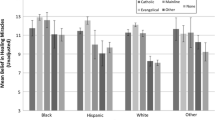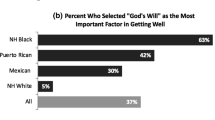Abstract
This study was conducted to determine the association between religious belief and treatment adherence among those with mental illness. The sample size of this cross-sectional study was determined to be 255 patients diagnosed with mental illness via power analysis. A descriptive characteristics form prepared by the researcher, the Systems of Belief Inventory, and the Morisky Medication Adherence Scale were used to collect data. Patients were listed and chosen by using a simple random sampling method. This study found no significant correlation between religious belief and treatment adherence (p > .05). It was determined that treatment adherence was moderate in patients with high religious beliefs and that treatment adherence was low in patients with low religious beliefs. Religious belief was not a factor influencing treatment adherence among those with mental illness.
Similar content being viewed by others
References
Alıcıkuşu, A. (2009). Psychiatric treatment of patients with schizophrenia attitudes [Unpublished Master’s Thesis]. Gazıantep, Gazıantep Unıversity
Altuntaş, Ö. Ş, Karakaş, S. A., Olçun, Z., & Polat, H. (2017). An investigation of the relationship between schizophrenic patients’ strength of religious faith and adherence to treatment. Archives of Psychiatric Nursing, 32(1), 62–65.
Baetz, M. R., Bowen, G. J., & Koru-Sengul, T. (2006). How spiritual values and worship attendance relate to psychiatric disorders in the Canadian population. Canadian Journal of Psychiatry, 51(10), 654–661.
Baldacchino, D. (2006). Nursing competencies for spiritual care. Journal of Clinical Nursing, 15(7), 885–896.
Belli, H., Özçetin, A., Ertem, Ü., Alpay, E., Bahçebaşı, T., Kıran, Ü. K., Baykız, A. F., & Bayık, Y. (2007). Şizofrenihastalarındabazısosyodemografiközelliklervetedaviileilişkilietkenler. AnadoluPsikiyatriDergisi, 8, 102–112.
Borras, L., Mohr, S., Brandt, P. Y., Gillieron, G., Eytan, A., & Huguelet, P. (2007). Religious beliefs in schizophrenia. Their relevance of adherence to treatment. Schizophrenia Bulletein, 33(5), 997–1001.
Bowie, J., Curbow, B., Laveist, T., Fitzgerald, S., & Pargament, K. (2001). The relationship between religious coping style and anxiety over breast cancer in African American women. Journal of Religion and Health, 40(4), 411–422.
Cohen, A. B., & Koenig, H. G. (2003). Religion, religiosity and spirituality in the biopsychosocial model of health and ageing. Ageing International, 28(3), 215–241.
Cummings, S. M., Neff, J. A., & Hussaini, B. A. (2003). Functional impairment as a predictor of depressive symptomatology: The role of race, religiosity, and social support. Health and Social Work, 28(1), 23–32.
Dutkova, K., Holubcikova, J., Kravcova, M., Babincak, P., Tavel, P., & Geckova, A. M. (2017). Is spiritual well-being among adolescents associated with a lower level of bullying behaviour? The mediating effect of perceived bullying behaviour of peers. Journal of Religion and Health, 56(6), 2212–2221.
Erci, B., & Aktürk, Ü. (2017). The system of belief ınventory: A validation study in Turkish cancer patients. Journal of Religion and Health, 57(4), 1237–1245.
Ervatan, S. Ö., Özel, A., Türkçapar, H., & Atasoy, N. (2003). Depresifhastalardatedaviyeuyum: Doğalizlemçalışması. KlinikPsikiyatri, 6, 5–11.
Güler, Ö. (2010). Dini inançvepsikolojiksağlıkilişkisinedairbirdeğerlendirme. ToplumBilimleriDergisi, 4(8), 95–105.
Holland, J. C., Kash, K. M., Passik, S., Gronert, M. K., Sison, A., Lederberg, M., Russak, S. M., Baider, L., & Fox, B. (1998). A brief spiritual beliefs inventory for use in quality of life research in life-threatening illness. Psycho-Oncology, 7, 460–469.
Kelleci, M., & Ata, E. (2011). Drug compliance of patients hospitalized in the psychiatry clinic and the relationship with social support. Journal of Psychiatric Nursing, 2011(2), 105–110.
Koenig, H. G. (2009). Research on religion, spirituality and mental health: A review. The Canadian Journal of Psychiatry, 54(5), 283–291.
Köylü, M. (2007). Ruhsağlığıve din: Batıtoplumuaçısındanbirdeğerlendirme. On DokuzMayısÜniversitesiİlahiyatFakültesiDergisi, 23(23), 65–92.
Kurt, A. (2009). Dindarlığıetkileyenfaktörler. UludağÜniversitesiİlâhiyatFakültesiDergisi, 18(2), 1–26.
Moaddel, M., & Karabenick, S. A. (2008). Religious fundamentalism among young Muslims in Egypt and Saudi Arabia. Social Forces, 86(4), 1675–1710.
Mohr, S., & Huguelet, P. (2004). The relationship between schizophrenia and religion and its implications for care. Swiss Medical Weekly, 134, 369–376.
Musick, M. A., & KoenigHaysCohen, H. G. J. C. H. J. (1998). Religious activity and depression among community-dwelling elderly persons with cancer: The moderating effect of race. The Journal of Gerentology, 53(4), 218–227.
Olfson, M., Mechanıc, D., Hansell, S., Boyer, C. A., Walkup, J., & Weıden, P. J. (2000). Predicting medication noncompliance after hospital discharge among patients with schizophrenia. Psychiatric Research, 51, 216–222.
Perkins, D. O. (2002). Predictors of noncompliance in patients with schizophrenia. Journal of Clinicil Psychiatry, 63, 1121–1128.
Shafranske, E. P. (2009). Spiritually oriented psychotherapy. Journal of Clinical Psychology, 65(2), 147–57.
Tepper, I., Rogers, S. F. A., Coleman, D. M., & Malony, H. N. (2001). The prevalence of religious coping among persons with persistent mental illness. Psychiatric Services, 52(5), 660–665.
Yılmaz, E., & Okanlı, A. (2015). The effect of internalized stigma on the adherence to treatment in treatment in patients with schizophrenia. Archives of Psychiatric Nursing, 29(5), 297–301.
Yılmaz, S. Psikiyatri hastalarında ilaç yan etkileri ve ilaç uyumu. [Unpublished Master’s Thesis]. İstanbul Üniversitesi Sağlık Bilimleri Enstitüsü; 2004
Acknowledgments
We are grateful to the individuals all patients who participated in this study.
Author information
Authors and Affiliations
Contributions
Study conception/design; FK, AG, AÖ. Data collection/analysis; FK, AG, AÖ. Drafting of manuscript; FK, AG, AÖ. Statistical expertise; FK, AG, AÖ. Administrative/technical/material support); FK, AG, AÖ.
Corresponding author
Ethics declarations
Conflict of interest
None of the authors reports conflicts of interest.
Additional information
Publisher's Note
Springer Nature remains neutral with regard to jurisdictional claims in published maps and institutional affiliations.
Rights and permissions
About this article
Cite this article
Kavak Budak, F., Gültekin, A. & Özdemir, A.A. The Association Between Religious Belief and Treatment Adherence Among Those with Mental Illnesses. J Relig Health 60, 2428–2437 (2021). https://doi.org/10.1007/s10943-021-01251-4
Accepted:
Published:
Issue Date:
DOI: https://doi.org/10.1007/s10943-021-01251-4




